Transcripts of interviews with witnesses and participants in history, of expert observations from retrospective conferences examining key events and concepts in Israel's development, and of CIE webinars and workshop sessions

Ashraf Ghorbal represented Egypt to the US for four years from 1968 to 1972 until Egypt restored diplomatic relations with the US in the wake of the October War. Ghorbal was Sadat’s Ambassador in Washington for 11 years until 1984. He credits Sadat with foresight in setting out and fulfilling his diplomatic objectives; breaking from the USSR, aligning Cairo with the US, harnessing US diplomacy under Kissinger and Carter to secure Sinai’s return to Egyptian sovereignty, and even if that meant signing agreements and recognizing Israel.

Omar Sirry provides intimate details of the diplomatic aftermath of the October 1973 War, the Kilometer 101 talks, Kissinger’s choreography of the December 1973 Middle East peace conference, and admiration for Sadat as the “modern Egyptian Pharaoh” who was not ever politically passive but took repeated initiatives for Egypt’s benefit.
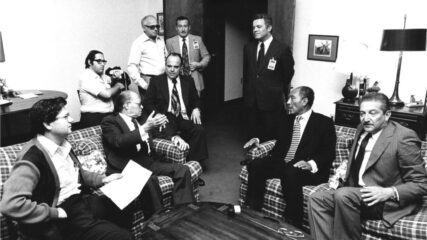
In the 1970s, US State Department Ambassador Michael Sterner was privy to Sadat’s preference for step-by-step diplomacy PRIOR to the 1973 October War. He is critical of the Carter administration for being too satisfied with only a bilateral Egyptian-Israeli Agreement.
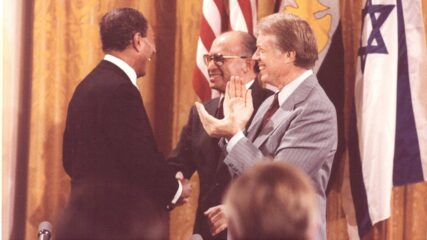
U.S. diplomats Hermann F. Eilts, Samuel W. Lewis, William B. Quandt, Harold H. Saunders and Daniel C. Kurtzer discuss President Carter and the 1978 Camp David negotiations with Ken Stein at a conference at Hofstra University.

Recounting events at the Egyptian-Israeli-American negotiations, a dozen American, Israeli and Egyptian participants discuss those 13 days of negotiations. Negotiators agreed that they pursued success through “constructive ambiguity,” some at high levels, so the respective sides could agree, for example, on using the term “modalities” to describe a future element that could not be defined in a more tangible way. President Carter and Israel’s attorney general at the time of Camp David disagreed at the conference about what Prime Minister Begin promised on the duration of a settlement moratorium. William Quandt, an NSC official, acknowledged that there was no written record of a Begin promise for three months. Carter claimed the promise was in his diary notes, but others who saw Carter’s diary said no such promise was made or was in Carter’s notes.

The Shiloah Center for Middle Eastern and African Studies, Tel Aviv University, March-17-18, 1981, Reprinted with permission. Participants included researchers, academics, politicians, and business people.

Jimmy Carter, “The U.S.-Iran Relationship, the Shah’s Downfall, Khomeyni’s Rise to Power, and the Hostage Crisis,” an Emory class presentation, Atlanta, March 24, 1985, recorded and transcribed with permission.

Hermann Eilts played a pivotal role in representing the U.S. to Egypt and vice versa in the vital 1973-1980 period when Egypt embraced Washington and turned away from Moscow, and made peace with Israel. Eilts knew Egyptian President Sadat as well as any American official in the period. He provides rich detail and vivid insights into Sadat’s often mercurial decision-making.
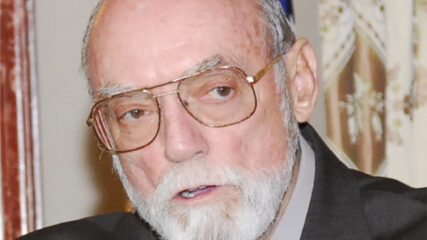
Sam Lewis was the U.S. ambassador in Israel when Menachem Begin was prime minister; his influence was most significant in keeping a taut and fraught Israeli-U.S. relationship from unravelling in the Camp David era. Lewis’ recollections and conclusions are enormously incisive.
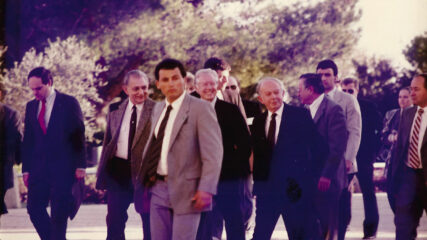
A life-long Israeli civil servant, Epi Evron was deeply engaged with Kissinger, Sadat, Meir, Rabin, Carter, Begin and others, as Egyptian-Israeli negotiations unfolded in the 1970s. One will find crisp in his interview insightful assessments of personalities, decision-making processes, and colorful vignettes.

From 1961 until the early 1980s, Harold Saunders was a key US State Department bureaucrat, an enormously capable word-smith. He had his hand in drafting the 1974-1975 ARab-Israeli Disengagement Agreements, Camp David Accords and E-I Treaty. His memory for detail enabled consequential decision-makers to understand the historical context of events and ideas such as ‘land for peace,’ ‘territorial integrity,’ ‘legitimate rights,’ and a myriad of diplomatic promises made spanning multiple presidencies.

July 16, 1992 Ken Stein Interview with Ambassador Roy Atherton, Washington, D.C., July 16, 1992 Alfred Roy Atherton Jr. participated in U.S-Soviet Middle East negotiations and formulation of the Rogers Plan, 1969; Kissinger-Ismail secret meeting…

From 1974 – 1981, Dan Pattir served as advisor on media and public affairs for Prime Ministers Yitzhak Rabin and Menachem Begin. Prior to working for two Prime Ministers, he Pattir worked in the Israeli media, and here he recalls in detail how Kissinger maneuvered the Geneva 1973 conference to keep the Soviets out of decision-making. Likewise he was intimate with the negotiating details and personal relationships that unfolded between Egypt and Israel in that period, especially 1977-1979 including his rendition of the September 1978 Camp David negotiations. Pattir concluded that the Carter administration, no matter how long it earnestly tried, it failed to grasp that neither Egypt nor Israel, were going to allow other Arab states or the Palestinian issue to interfere with their eagerly sought mutually beneficial bilateral agreement, before, during or after Camp David.

Moshe Sasson spanned four decades in his service to Israel, from the Haganah’s Arab Department of Intelligence in the 1940s to being Israel’s Ambassador to Egypt in the 1980s. He recollects analytically and in detail his conversations with Arab leaders at Lausanne as well as personal impressions of Moshe Dayan and Anwar Sadat. A tour de force.

October 29, 1992 After learning Hebrew, David Korn rose to become chief of the political section while at the U.S. Embassy in Tel Aviv (1968 to mid-1971). Later, he was office director for northern Arab…

In the 1975-1979 period, Hanan Bar-On served in the Israeli Embassy in Washington and then for seven years as director general of the Foreign Ministry. His insights highlight the building strain that evolved between Jimmy Carter and Menachem Begin. From an Israeli viewpoint, he recalls how unpredictable Zbigniew Brzezinski behaved toward the Israelis, how flexible Moshe Dayan was in seeking compromises, and how the Leeds Castle foreign minister talks in England in July 1978 established the contours for the successful Camp David negotiations two months later. He sheds important light on the context of the four Egyptian-Israeli agreements: Sinai I (1974), Sinai II (1975), the Camp David Accords (1978) and the Egyptian-Israeli Peace Treaty (1979).
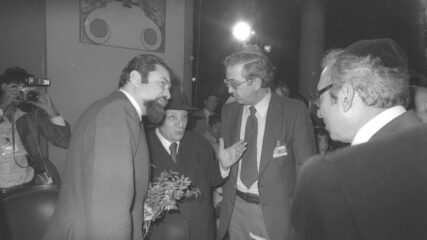
As a longtime confidant of Menachem Begin involved in the Herut party, Eliyahu Ben-Elissar was Israel’s first ambassador to Egypt. He was a staunch supporter of keeping the area of the West Bank — Judea and Samaria — under Israeli control. Later he became Israel’s ambassador to France and then the United States.
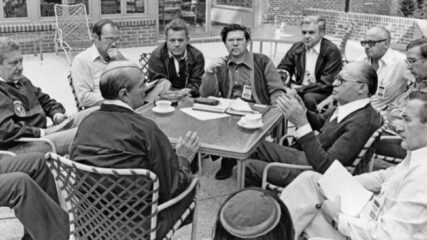
Tamir was a 35-year veteran of the Israeli army, attending all Egyptian-Israeli negotiations as a strategic planner. He stated that he thought the 1973 war could have been averted if Golda Meir had responded to Sadat’s pre-war overtures. He credits Henry Kissinger’s negotiating successes of the post-1973-war period as laying the basis for the successful 1978 and 1979 Egyptian-Israeli agreements.

From the vantage points of Amman and Damascus in the 1970s and 1980s, Patrick Theros heard the sharp political opinions deeply felt about the United States and the profound anger voiced by Arafat, Jordan’s King Hussein and Syria’s President Assad for each other.
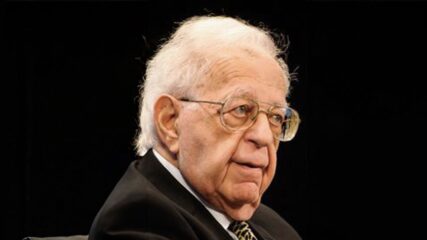
Serving as director general of the Israeli Ministry of Foreign Affairs in 1976-1977, Avineri recounts Romanian overtures to Rabin for a visit to gauge interest in another agreement with Egypt. He estimates that Rabin and Begin both took strategic considerations in hand in negotiating; he is highly critical of Carter’s political naivete.
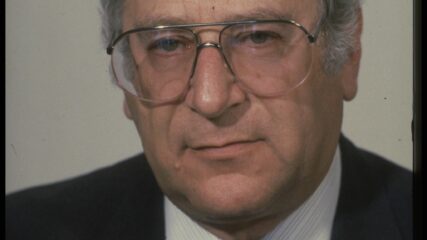
For years, Naftali Lau-Lavie worked closely with Moshe Dayan. His remarks here focus on Dayan as Menachem Begin’s foreign minister (1977-1979). He provides sumptuous detail on Dayan’s thinking and interactions with the Carter administration as it tried to force a Palestinian/PLO state on Israel in seeking a comprehensive Middle East peace.

Mustafa Khalil served as the primary Egyptian negotiator in tying up the Egyptian-Israeli treaty with Israeli Foreign Minister Moshe Dayan between September 1978 and March 1979. Though most of the talks took place in Washington, the final excruciating details were negotiated in difficult exchanges in Jerusalem between Jimmy Carter and Menachem Begin in the week before the March 26, 1979, treaty signing.
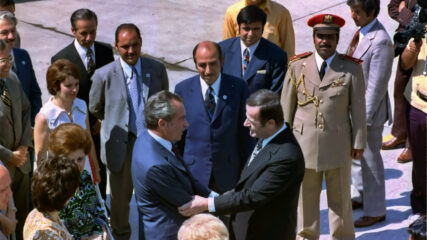
From 1970 to 1984, Khaddam served as Syria’s foreign minister, and later he was Syria’s decision-maker for actions in Lebanon. He recounts Syrian anger toward Egyptian President Sadat’s slow but continual bilateral engagement and recognition of Israel. He recalls how Syrian President Assad, after a four-hour meeting, refused Henry Kissinger’s invitation to attend the 1973 Geneva peace conference, not wanting to sanction the closeness Sadat was establishing with Israel and with Washington. These were the same reasons why Syria refused President Carter’s invitation to attend a similar Middle East peace conference in 1977. Khaddam says, “We were shocked by Sadat’s actions.”

With a keen memory to detail, Nicholas Veliotes engaged an array of American and Middle Eastern political leaders. This interview is laced with charming and enthusiastic candor as he served in American diplomatic positions from 1973 to 1986 in Tel Aviv, Washington, Amman and Cairo. He was present when sensitive U.S. policies were debated and operationalized. His assessments of Kissinger, Sadat, Meir, Nixon, King Hussein, Brzezinski, Carter, Vance and a whole panoply of Israeli officials bubble with content; the vignettes he shares about Nixon and Brzezinski are priceless. In the late 1970s and early 1980s, Veliotes, along with Morris Draper, Hermann Eilts, American consuls general in Jerusalem and other U.S. officials failed in repeated attempts to secure PLO leader Yasser Arafat’s participation in the diplomatic process.














